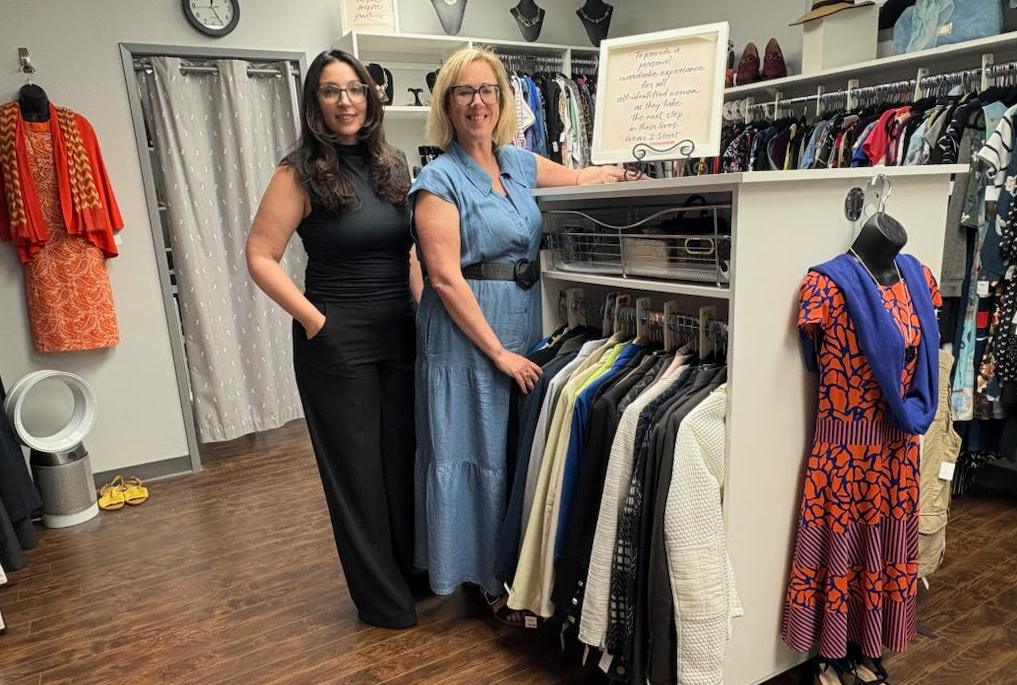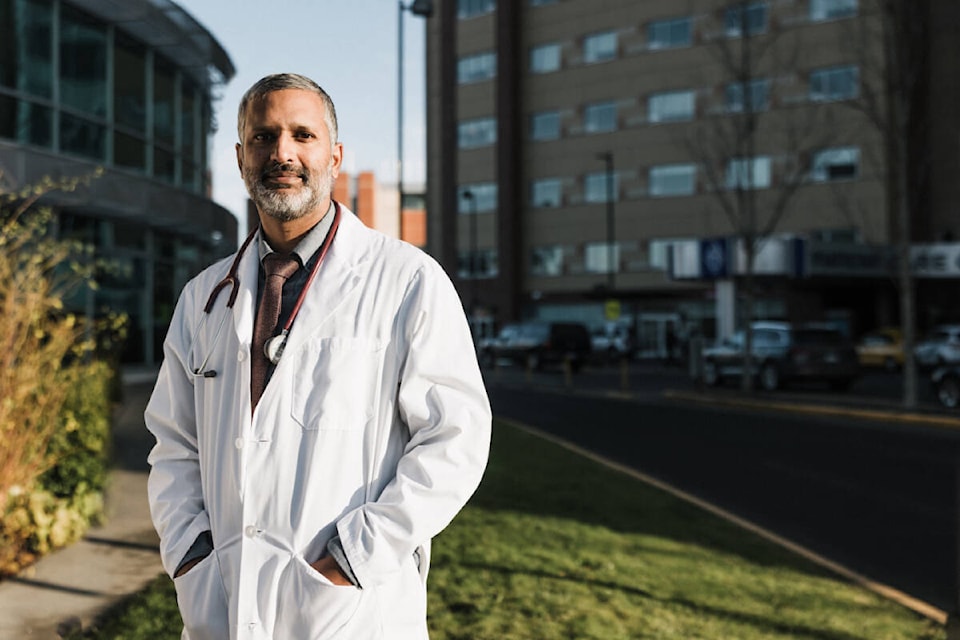Dr. Dionisopoulos has known since February that she wanted to work in Port Alberni for one of her locums (placements filling in in understaffed rural clinics and hospitals). After completing pediatric residencies in various parts of the US, she had attained her Canadian license by doing a residency at McGill and then spent about a year doing rural locums in Prince Edward Island, New Brunswick, and Nova Scotia.
When she contacted the pediatrician at West Coast General Hospital, she says he was extremely helpful and willing to bring her onboard.
“Originally, Port Alberni had two pediatricians, but the other one refused to get vaccinated so he lost his hospital privileges,” Dr. Dionisopoulos said. “So it's just one pediatrician serving the whole community.” A second pediatrician, available over a longer period of time, would have alleviated the pressure on him.
The need for more healthcare workers at Vancouver Island hospitals is well documented. Earlier this month, an employee at the Port Alberni hospital told CBC News that the staffing shortage is so dire, the emergency room could have to shut down for eight hours at a time.
As Saanich Peninsula Hospital ER physician Dr. Jeff Unger has told us in the past, full emergency rooms are usually a result of an overflow in the rest of the hospital: since there are too many admitted patients in wards, they need to use ER beds, so there aren’t enough left for emergency patients.
A long pandemic, delayed vacation time, and illnesses among healthcare workers have joined to create a crisis that has hit rural and remote emergency rooms in BC the hardest, with hospitals in Port Hardy and Port McNeill having to shut down earlier this month. People have died waiting for ambulances and closed emergency departments across the province.
These closures were the subject of a BC Green Party statement on July 19. Among other things, the party called on the province to “create a locum strategy so that doctors can take holidays and patients have reliable access to healthcare when their family physicians are away.”
Dr. Dionisopoulos says her experience with BC’s current rural locum program has made her not want to come back.
After going through a difficult application process, she still had to cut her intended work period in half, despite seeing the need for physicians like herself and being willing to work at West Coast General Hospital for at least four months. Her problems with the system began with the application process for a BC License.
‘A horrible and redundant process’
Port Alberni is the first out of several locum placements where Dr. Dionisopoulos would have had personal connections to people who live in the same community, so she was eager to start the process as soon as possible. She started making her inquiries five months before her intended start date: July 1.
Emails to Dr. Dionisopoulos from the College of Physicians and Surgeons of British Columbia (CPSBC) show she wasn’t allowed to apply more than three months before her intended start date. Then there was the application process itself.
“When you're applying for the license, it's such a horrible and redundant process,” Dr. Dionisopoulos said.
Her emails with the CPSBC reveal evidence of the frustrating quagmire of arbitrary hoops she had to jump through. After already submitting a long list of required forms, transcripts, and certificates for her BC license application, Dr. Dionisopoulos was told she hadn’t entered one or two bits of information that she was sure she’d already sent. Her three references faced the same problems, with paperwork supposedly not arriving, or with missing information—and everything had to be sent by references themselves, further slowing the process.
Throughout this email chain, Dr. Dionisopoulos responded to the CPSBC representative immediately and often had to follow up several times, asking about the status of her application, only to wait days for a reply.
“The whole [application] process itself took three and a half months,” she said. Her start date was pushed back by two weeks.
The CPSBC would not answer Capital Daily’s questions about the delays with Dr. Dionisopoulos’ application, citing privacy laws.
“Generally speaking, the process for fast-tracking physicians who hold licensure in another Canadian jurisdiction is straightforward and delays may be the result of simple matters such as not receiving appropriate paperwork or payment in a timely matter [sic],” they said in an emailed statement.
The application process also involves a multitude of fees: $1,152 for the application itself, $640 college registration fee, plus fees to get certifications like transcripts mailed to the college. All of these are the responsibility of the physician applying for the license.
“Each time I have to request a certificate of professional conduct…it’s $125,” Dr. Dionisopoulos said. “For all of my American exams, I think it cost $75 for me to send just my transcripts.”
The BC license, like others across Canada, is also only valid until the end of the calendar year, after which physicians need to go through a separate re-application process.
No incentives in BC
There are no differences in the medical requirements for physicians from province-to-province, Dr. Dionisopoulos said. But each time a physician applies to work in a rural locum in a different province, they need to submit all of the same transcripts, references, and documentation to various colleges and health authorities.
The Globe and Mail published an overview in 2019 of the cumbersome and expensive licensing process for physicians, many of whom echoed Dr. Dionisopoulos’s experience. They reported that a growing group of medical associations were pushing for national licensing, to make it easier for physicians like Dr. Dionisopoulos to help fill the gaps in rural and remote parts of the country.
These days, however, some provinces have taken steps to incentivize physicians to take on rural locums in their communities, to try to alleviate the impacts of staff shortages on their healthcare systems. Prince Edward Island, for example, paid for all of Dr. Dionisopoulos’s licensing fees.
When she found herself without work for the first two weeks of July, after her BC license process was delayed, hospitals in New Brunswick worked with their health leaders to bring her there.
“They offered to organize and pay for and help expedite the New Brunswick license and I got it in less than 24 hours,” Dr. Dionisopoulos said.
BC has no programs in place to pay for out-of-province physicians’ licenses as an incentive for them to come work here.
Dr. Dionisopoulos was told as much in an email from the physician lead of locum services at the Rural Coordination Centre of BC. “My hope is that with national licensure, this will become a thing of the past, but we are not there yet and don’t have anything in place in the meantime,” the physician wrote.
Even after Dr. Dionisopoulos had paid for this BC license, in both money and time, and had it in hand, she was told there was no allotted time (or funding) for her to stay in Port Alberni longer than the end of August.
“It’s Island Health’s job to cover [the costs of] my accommodation and rental car,” Dr. Dionisopoulos said. “It's Rural Locum BC’s job to pay for the cost of [traveling] to the locum. So it's just a bunch of places I have to send different documents and worry about what's covered and what's not.”
Without Island Health funding her accommodations for the four months she had intended to stay, Dr. Dionisopoulos has no choice but to go back to Montreal at the end of August and reevaluate her plans.
Longer rural locum placements have not been an issue in other provinces, she said. Prince Edward Island, for example, was easily able to accommodate her expenses for a four-month locum.
“I find this ridiculous…there's such a big need,” she said. “Every time I go into the [West Coast General] hospital, every healthcare worker I interact with [says], ‘We are in desperate need of a pediatrician. Please, please come.’ And then they just make it so hard for me to be here.”
After she leaves at the end of August, Dr. Dionisopoulos says there may be room for her to come back and work in Port Alberni for a few days in September and October. But the dates are so disparate and the process so disorganized, she will not be returning to Vancouver Island.
“It doesn't really make sense for me to come all the way here to do that,” she said.
Island Health did not respond to Capital Daily’s questions in time for publication.






.jpg)



.jpeg)






